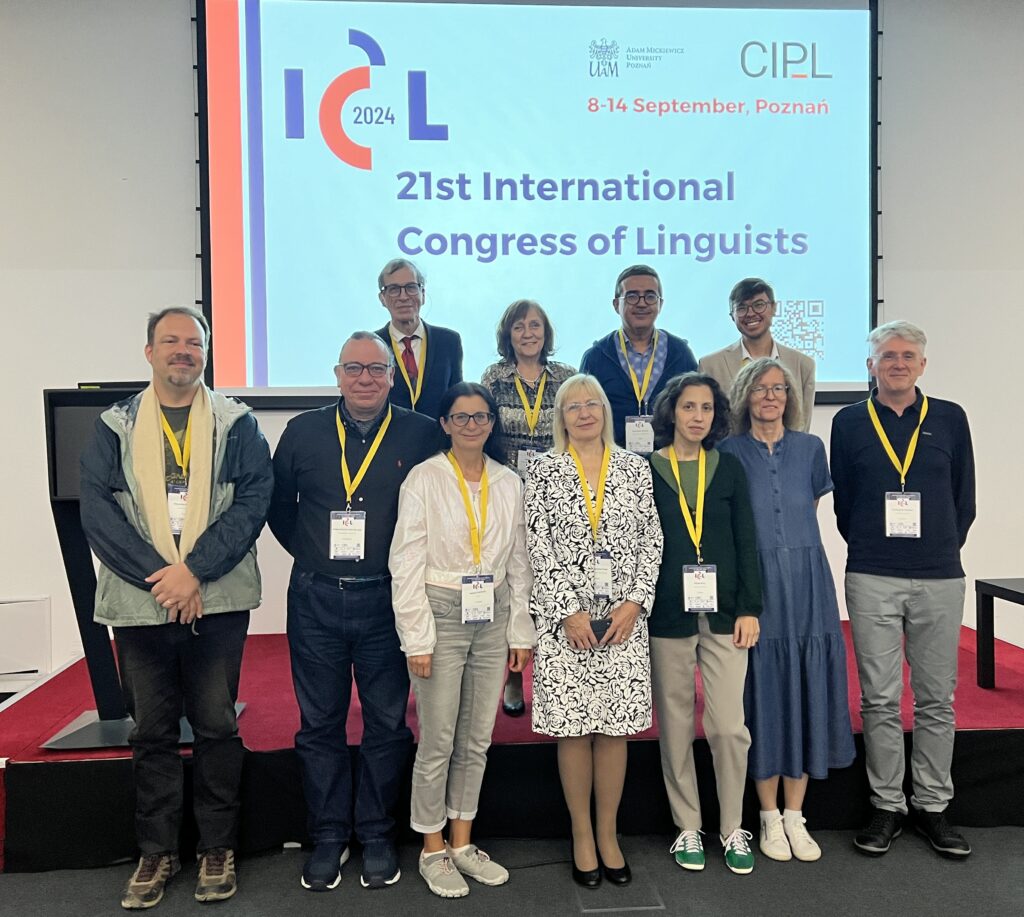Many Sections, Focus streams, Special panels and Workshops were held during ICL21. The Interlinguistics Workshop with 12 lectures (from 11 countries) was led by Ilona Koutny, Director of Interlinguistic Studies (UAM) and Nicolau Dols (University of the Balearic Islands, ES) on Thursday afternoon and all day Friday. During the opening, Duncan Charters, President of UEA and François Lo Jacomo, Secretary of the Academy of Esperanto greeted participants and then Ilona Koutny outlined the terrain of interlinguistics and Esperantology and finally Nicolau Dols presented the topics and lecturers of the section.
Interlinguistics has historical roots in the ICL. Indeed, during the 2nd congress in 1931 in Geneva, the well-known Danish linguist Otto Jespersen (supporter of Esperanto, later of Ido and creator of Novial) initiated a discussion on the problem of an international language in which well-known linguists participated (including Edward Sapir). He introduced interlinguistics as a branch of linguistics (he previously published his work A New Science Interlinguistics, Cambridge, 1930).
A wide range of diverse topics were presented: (https://icl2024poznan.pl/userfiles/file/ICL_2024_Programme_Final-Full_08_Sep.pdf p. 31):
Sabine Fiedler (DE) dealt with the topic of Esperanto specialist literature during recent decades. Nicolau Dols (ES) analyzed convergent and divergent trends in Esperanto based on the corpus tekstaro.com. Christopher Gledhill (GB/FR) presented problems of paronyms in the case of Esperanto terminology. Philippe Planchon (FR) discussed the uses of the Esperanto suffixes -ig (transitive, causative) and -iĝ (intransitive, mediopassive) in connection with verbal valency.
Marc van Ostendorp (NL) via video connection presented his research on the pronunciation of Esperanto acronyms and compared it to other approaches. Natalja Dankova (CA) analyzed the use of articles in spontaneous, spoken texts by speakers of Romance (Italian, Spanish) and Slavic (Polish, Russian) languages. François Lo Jacomo (FR) addressed the way in which Esperanto is enriched by new words. Ilona Koutny (HU/PL) spoke of the legacy of István Szerdahelyi (interlinguist, innovative Esperantologist and founder of the Esperanto specialty of Eötvös Loránd University in Budapest) on the centennial of his birth.
Fabio Fortes (BR) investigated to what extent the basic values of Esperantists such as linguistic democracy, linguistic rights, and a common language in intercultural communication are accepted among non-Esperantist students in Brazil. Başak Aray (TR) spoke about logical empiricism and language planning in the case of Rudolf Carnap. Veră Barandovská-Frank (CZ/DE) highlighted the special role of Latin and the Romance languages in language planning. Jorge Antonio Leoni de León (CR) chose a current topic, namely the use of AI (artificial intelligence) for the construction of languages in its theoretical, methodological and ethical aspects.
More than 30 congress members participated, including students of the post-graduate program in interlinguistics at AMU, who had taken their final exams on Monday through Wednesday. There were also some non-Esperanto speakers. The lectures were held in English, but there were also Esperanto-language questions afterwards, such as those by Alicja Sakaguchi (a well-known interlinguist who represents a narrow approach to the field). There are plans to publish a book from the proceedings. Thanks are owed to the Esperanto Studies Foundation for the support.
In addition to the interlinguistics section, there were lectures by other Esperantists at the ICL. Bengt-Arne Wickström, Ida Stria and Sean O’Riain in the Section on Language Policy, Rafał Darasz in the Focus stream on Sign Language and Ana Alebić-Juretić in the Section devoted to historical linguistics (the last two have just finished the interlinguistic studies at AMU).
That weekend, during the final edition of the Polish Esperanto cultural event Arkones, a number of speakers contributed to the program: Nicolau Dols (on the Centenary of the Catalan Anthology and recited a poem in Catalan and Esperanto versions), Antonio Leoni de León (Central American Conservatory of Cultural Property), Philippe Planchon (Family names and stories), François Lo Jacomo (A new UNESCO resolution on Esperanto?) and Ilona Koutny (Multilingual thematic dictionaries on paper and online – with interlinguistic student collaborators; A Report on the ICL and a Presentation on Szerdahelyi). Duncan Charters and several other professors and students of the Interlinguistic Studies contributed to the variety of the program.

Photo: Presenters of the Interlinguistics Workshop

